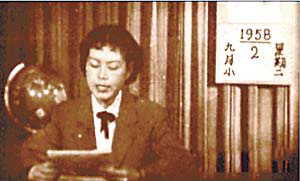Before the microblog, there was radio ...
Updated: 2011-09-18 07:39
By Cang Wei (China Daily)
|
|||||||||||
 |
|
Shen Li was the first TV presenter in China, hosting a program that became a champion of consumer rights. [China Daily] |
|
 |
|
Shen Li was one of the first television presenters in China, and her popularity rose with the number of TV sets in the country. [Provided to China Daily] |
TV stations in the 1950s broadcast four programs a week, totaling just 10 hours. Television announcers did not attract as much public attention as they do now, and Shen Li, the first TV presenter in China, remained relatively unknown for many years. Nobody recognized her on the streets.
As economic conditions improved, the country caught up quickly. By 1978, China had 1 million television sets.
From January to May in 1983, a program hosted by Shen received 1,300 letters from viewers. And in June, of the 7,248 letters sent to CCTV, more than 3,000 were addressed to her. She was no longer anonymous.
Many of those letters had a cause - complaining about the quality of commodities or products. As these grouses went on the air, manufacturers had to sit up and take note, and take action. It was the first indication of the power of the media in galvanizing public opinion.
By 1996, the number of television sets had soared to 232 million, and currently, China is the world largest market - with more than 1 billion viewers and television sets in over 350 million households.
But television's gradual monopoly was being challenged by the time the new millennium arrived. In 2000, the Internet showed how powerful it was going to be with 10 million users online; about 18 per cent of all households in major cities like Beijing, Shanghai and Guangzhou already had access to the World Wide Web.
Its growth can be best documented by the number of e-mail users.
On Sept 20, 1987, China's first e-mail was sent to Germany from Beijing. According to iResearch, one of the country's leading online market research companies, there were 259 million mailboxes in China in 2010. The forecast is that by 2014, the total number will reach 416 million.
Chen Lei, the 23-year-old son of Chen Jian, says he has three e-mail accounts, each designated for a different function. He also has several Web forum accounts, and logs in to his university's bulletin board system or BBS. And, like most young people in China, his favorite online instant messaging system is the homegrown QQ.
QQ was China's answer to ICQ, the instant chat software that appeared in 1996 on the Internet.
Its popularity spurred Chinese company Tencent Inc. to launch QQ the same year. Two months after it appeared, QQ had more than 200,000 subscribers. Three years later, in 1999, Tencent had captured 80 percent of the Chinese instant messaging market and it remained the country's largest Internet service portal for many years.
Apart from QQ, competitors nudging each other for a larger slice of the pie include MSN, Renren (a Chinese copy of Facebook), and the Flying Messenger provided by China Mobile.
"These software make life much more convenient and interesting," says Chen Lei, and added he also finds the blog and micro blog "indispensable" platforms that make life "complete".
The blog was introduced to China in 2002 and three years later, a report released by the Chinese Academy of Social Sciences showed that one third of Chinese Netizens are bloggers.
Chen Lei says blogging is now part of his life.
"My father doesn't understand why I prefer to share my feelings with strangers on the Internet," says the young man, who is currently working for a foreign company in Shanghai.
"I like to communicate with people I may never meet, because I am free to speak my mind. And, the feeling of being connected is amazing."
You can contact the writer atcangwei@chinadaily.com.cn.
Hot Topics
Organ transplant bonds mother and son
Editor's Picks

|

|

|

|

|

|







